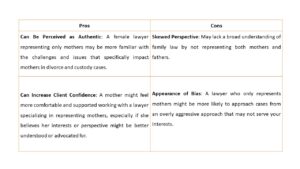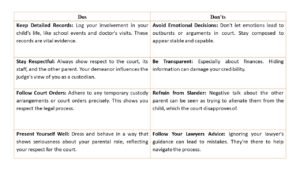Key Issues
- In custody disputes, how do courts determine if one parent should be awarded sole custody of the child?
- In custody disputes, how do courts decide what is in the child’s best interests?
- What is the difference between sole and shared custody?
- What is the difference between legal and physical custody?
- Are mothers favored in child custody contests?
- How can a parent’s emotional and financial fitness affect child custody disputes?

What Type of Evidence Must the Mother Prove to Get Sole Custody of the Child?
The primary evidence must demonstrate that the mother’s custody of the child would be in the child’s best interest.
Establishing evidence needed to prove these assertions to the court must be more than bare allegations. The mother must offer truthful, relevant, and credible evidence to support her claims against the father.
Do Mothers Seeking Sole Custody Have an Advantage Over Fathers?
Mother’s fitness for sole custody has been historically favored
Courts have historically favored mothers as superior caregivers, especially in divorce cases involving young children. Divorce lawyers have referred to this judicial preference as the “child’s tender years” doctrine.
There has been an unspoken preference favoring custodial mothers. The “mama bear” doctrine is still alive today in many jurisdictions. A case can be made that there exists a cultural belief that a mother’s emotional bond with a young child is substantially more robust and loving than what the father can provide. This is especially true if the child is in their tender years, usually children under ten.
Notwithstanding, there has been a shift in recent years towards states requiring family court judges to take a more neutral and objective approach in determining the division of child custody.
In light of this shift, divorce courts in most state jurisdictions appear to be making a concerted effort to make gender-neutral decisions without prejudice or favor and on a case-by-case basis.
What Are The Primary Differences Between Legal and Physical Custody?
Sole legal custody
It can be said that being awarded sole custody means that one parent has both sole legal and sole physical custody of the child.
Sole legal custody means the parent will have the legal right to make all critical decisions regarding the child’s life, including:
- Health decisions
- Legal decisions
- Education decisions
- Religious upbringing decisions
- Extracurricular activities
Sole physical custody is when the child resides full-time with one parent and cares for the child daily.
How does the court decide if the mother should receive sole legal and physical custody?
First and foremost, the court must be convinced that the child’s best interests will be served if the mother is awarded both physical and legal custody. This fact can be convincingly proved if the court determines that the child’s safety and welfare might be compromised if the father were to share custody.
The court must review and weigh all the evidence to make these determinations. In doing so, the court must consider many factors, which will be examined later in the article. For now, consider the following legal tip:
 (Above Image: A heart-warming image of a Mother and her son on a picnic blanket watching a glorious sunset.)
(Above Image: A heart-warming image of a Mother and her son on a picnic blanket watching a glorious sunset.)
Should I Hire a Divorce Attorney to Represent Me?
Definitely. Especially if you are seeking sole custody of the children. A skilled divorce and family lawyer will guide you through the child custody process and ensure you gather the evidence you need to prevail.
The issues surrounding dividing custody are often emotionally charged. This is especially true when one parent seeks sole legal and physical custody of the children.
You are too close to the child custody issues to be objective and convincing to a court, which is why representing yourself is rarely advised.
If you are going through financial hardship and unable to afford to retain a divorce lawyer, consider using a local legal aid service. Many such services offer legal representation services for the parent and advice on how to best protect your children’s legal rights and safety needs.
According to the U.S. Census Bureau, as of 2021, 80% of custodial parents are mothers, highlighting the historical trend of courts granting mothers custody. This statistic underscores the frequency of mothers being awarded custody but also contextualizes the ongoing discussions about gender neutrality in custody decisions.
Should I Hire A “Mothers-Only” Divorce Attorney?
The decision to hire a “mothers-only” divorce lawyer depends on the facts of your case. However, the best approach is to balance the upsides and downsides of retaining a mothers-only attorney:
Potential pros and cons of retaining a “mothers only” attorney:
Divorce Tip
What Factors Favor the Mother Being Awarded Full Custody?
Meeting the child’s basic needs
The mother must show she can provide for the child’s basic needs, which include providing the child with the following:
- A safe and clean living space
- Healthy meals and regular mealtimes
- A consistent schedule for different types of activities
- Consistent and regular emotional support
- An engaged and high level of involvement in the child’s extracurricular activities.
The court will also consider whether the mother has been and continues to be the child’s primary caretaker and whether the mother has the time, resources, patience, and dedication to care for the children.
Divorce Tip
What Factors Does the Court Consider When Determining a Parent’s Financial Stability?
Determining a parent’s financial stability is essential when considering child custody matters. The court wants to ensure the custodial parent can provide a safe, healthy, and secure environment.
Most divorce courts will consider the following financial factors:
- The present and expected net income of the parent. The court sometimes requires the parents to fill out a sworn financial declaration and, if necessary, produce tax returns and bank statements.
- The total debt, expenses, and liabilities of the parent. These may include mortgage, rent, car payments, credit card debts, student loans, and other recurring expenses.
- The employment history of the parent. The court will look to see if there have been frequent and unexpected job changes or long periods of unemployment.
- The living conditions of each parent.
- Whether the parent has been financially reckless
The court will look for evidence of reckless spending and whether the parent has a history of bankruptcies, creditor lawsuits, or financial hardship —all of which will demonstrate the parents’ inability to pay their bills and cover expenses.
What Types of Evidence Demonstrates Financial Responsibility?
Courts favor financially responsible parents
On the positive side, the court also considers evidence of sound and responsible financial planning and management of their money and may include:
- Maintaining adequate savings for the child’s future education, summer camp, and extracurricular skill building, such as learning a foreign language and receiving instruction on how to play a musical instrument.
- Ensures the child is protected by adequate life and medical insurance.
- The parent has a favorable credit record should the need arise to borrow money to maintain the child’s basic needs.
- The parent has accumulated a solid savings account and other assets, such as real estate and savings bonds. These assets help the parent support the child’s basic needs and offer the child a higher level of security and standard of living.
What If the Child Emotionally Favors One Parent Over the Other?
The child’s preference matters
The court may consider a child’s preferences depending on the child’s age and maturity. However, this approach can backfire if the mother tries to pit the child against the father. This can result in the father’s alienation from the child, which can cause severe emotional and psychological damage to the child.
It is generally agreed that denying access to the other parent, especially for vindictive purposes, is dangerous and unfair to the child and the other parent.
What If the Father Is Less Available to Meet the Child’s Needs?
The absentee father
Should the father’s work schedule and availability not allow for supportive and meaningful parenting, the court will look to the parent willing and able to be there for the child after school, on weekends, and during vacations. This fact usually weighs heavily in the mother’s favor.
What If the Child Already Feels Emotionally Settled with The Mother?
Maintaining a healthy child’s status quo
Assuming the child is with the mother and resides at the family home, the court’s focus may shift to how well the child is presently doing in this environment, including having established friends and is doing well at school and enjoying local extracurricular activities.
What If the Mother Can Prove a More Stable Lifestyle for The Child?
Stability is always favored by the court
The court will favor the mother’s right to custody if she can establish that she can offer the child a preferable lifestyle, which can mean a more stable, child-friendly lifestyle.
What If the Father Moves Out of State or Far Away from the Child?
The distant parent
Should the father plan to relocate out of state far from the family home, this will likely influence the court’s decision in favor of the mother.
The court will consider how the father’s absence from the child’s life might impact the child’s emotional and psychological state and whether it reflects a form of child abandonment.
What If the Father Is Shown Not to Be Morally Fit?
The moral fitness of the parent
While this can be subjective, courts in most jurisdictions may consider each parent’s moral fitness, such as whether a parent’s behavior and decision-making reflect values not in the child’s best interest. In other words, the court determines the father poses a risk of danger and neglect to the child.
What If the Father Has a History of Domestic Violence?
Damaging evidence against the father if proved
If the father has a history of domestic violence, it will likely shape the court’s decision in the mother’s favor. The primary reason is the risk to the child’s safety and well-being – a risk that most courts will not tolerate.
What If the Mother Alleges the Father Has a History of Mental Illness?
Mental illness can be a sign of parental instability
Assuming the mother can provide evidence that the father’s mental illness risks the child’s well-being or affects his ability to provide safe and proper care, the court will closely examine all relevant aspects of the mother’s claim.
The court will want to examine the following alleged instability issues:
- Whether the severity of the illness will affect the father’s ability to care for the child.
- Whether the mental illness can affect the child’s safety or emotional welfare.
- The court may wish to consider the history of the father’s mental illness, including medical reports, treatment history, and sworn declarations or testimony of third-party witnesses.
- The court may wish to hear from both sides and allow the parties to present expert testimony on the mental health issues.
- The court may order an independent fitness and psychological evaluation of the father and, under certain circumstances, the mother.
What If the Mother Alleges the Father Abuses Drugs or Alcohol?
Suppose a mother offers evidence at trial that the father abuses drugs or alcohol, like the situation with mental illness discussed above. In that case, the court must examine and consider the evidence.
If the court finds that the father’s substance abuse risks the child’s safety or exposes the child to harmful environments, the judge will be inclined to award the mother sole custody of the child.
The court will consider the following drug and alcohol addiction factors:
- The severity of the substance or alcohol abuse.
- Risk to the child’s safety.
- The parent’s commitment to rehabilitation.
What Are the “Do’s” And “Dont’s” In Litigating a Child Custody Trial?
- During court proceedings, stay calm and respectful.
- Avoid emotional outbreaks, quarrels, or disrespectful behavior in court. I will harm your case and make you appear unstable.
- Keep accurate records and document the father’s negative behavior with the children. Emails and texts can be used to demonstrate unstable and irresponsible parental behavior.
- Obtain third-party statements of people who have observed negative interactions and behavior towards the child.
- Follow all court orders and always be respectful to the court. If temporary court orders are in place, follow them.
- Be candid and truthful regarding your financial condition. Hiding or minimizing your financial condition can quickly backfire and give the judge reason to doubt your moral fitness.
- Don’t be mean or aggressive and engage in hurtful slander against the father in the judge’s presence. The court might conclude you cannot be trusted and will engage in parental alienation should you be awarded most or all the custody.
Never commit perjury by knowingly making untrue and harmful accusations against the father, such as:
- The father has a history of child molestation.
- The father has served time in jail or prison.
- The father engages in criminal activity, such as dealing drugs.
- The father is a deadbeat and a drunk.
- The father is unable to keep a job.
In many jurisdictions today, a mother can quickly lose a child custody battle for engaging in harmful and untrue accusations. Also, committing perjury is a serious crime that can result in severe fines and sometimes even incarceration.
How Long Does It Take for A Judge to Rule on Sole Custody?
Depends on the case circumstances and the court’s docket
Most of the time, a judge will decide on general child custody issues at the trial’s conclusion or shortly after. However, in cases involving whether to award one parent sole custody, the time can be much longer, sometimes several weeks or months.
Here are some of the factors:
- The complexity of the case
- The trustworthiness of the parent’s evidence
- Whether the child is currently being subject to neglect
- Whether the judge has a particularly heavy caseload
- Whether the court must follow specific state-imposed timelines.
- Ensuring the sole custody decision reflects the child’s best interests may take weeks or months.
Will The Mother Automatically Be Granted Sole Custody If the Father Is in Prison?
This determination is made by the court and state statute
Should the father be incarcerated at the time the mother applies for sole custody, depending on the state rules of your jurisdiction, the court will consider several factors in determining what would be in the best interests of the child:
- The nature and type of crime involved
- The length of the prison term
- The quality of the relationship between father and child
- The child’s current emotional and psychological well-being
- Child safety issues
Can A Mother Obtain Full Custody Without Going to Court?
By binding agreement of the parties
Obtaining full custody of a child without going to court depends on the facts of the situation and your specific legal jurisdiction. In most cases, child custody arrangements are determined by family courts whose primary goal in custody matters is to ensure the child’s best interests.
The parents can agree on custody and parenting arrangements outside the formal divorce litigation process. The process is called divorce mediation or Alternative Dispute Resolution (ADR).
Once a final divorce settlement agreement has been mediated, drafted, and approved by the spouses and their lawyers, it can be submitted to the court for approval, which is formalized into a custody order. The agreement helps provide legal protection and enforceability of the custody arrangements.
Once The Court Rules On Child Custody It Be Later Changed?
Petition to modify child custody order
Should one of the parents’ circumstances change after the divorce decree, one or both parents may petition the court to modify its child custody order, including changing custodial arrangements and adjusting the non-custodial parent’s child support obligations.
Unfortunately, these types of hearings are usually heavily contested by the parties.
Frequently Asked Questions:
- How can I prove I’m the best parent for sole custody?
Collect evidence of your involvement and stability in your child’s life, including your emotional support, financial stability, and ability to provide a safe living environment.
- Will hiring a mothers-only attorney improve my chances of winning sole custody?
While a mothers-only attorney might offer specialized insight, weighing this against potential biases is essential. Choose an attorney based on their expertise and understanding of your case.
- Can the father’s financial situation affect custody decisions?
Yes, financial stability is a factor, but the court also considers the ability to provide a safe and supportive environment for the child, including emotional and physical well-being.
- What if the child prefers to live with me?
A child’s preference may be considered depending on the child’s age and maturity, but it won’t be the sole factor in custody decisions.
Prepare Yourself with the Right Support:
- Find a Good Lawyer: This is super important. You need someone who knows all about the rules of court and can fight for what’s best for you and your child.
- Think About Mediation: Sometimes, talking things out with a professional mediator can help you and the other parent agree on what’s best for your child without having to fight it out in court. It’s like having a referee for making decisions together.
- Join a Support Group: There are groups of people who are going through the same things as you. Being with them can make you feel less alone and give you some great advice because they understand exactly what you’re going through.
- Consider Counseling: This journey can be tough on your feelings. Talking to a counselor can help you stay strong and make the best choices for your child. It’s like having a coach for your emotions.
- Get Your Finances in Order: Knowing how you’ll take care of your child’s needs, including where you’ll live and how you’ll handle your finances, is important. Sometimes, talking to someone like a financial planner can help you plan better.

























